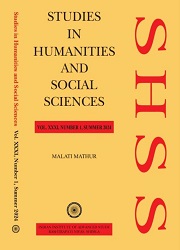Derision as Critique
Engaging with Matriliny in Colonial Kerala
Keywords:
Derision, Rhetorical Device, Matriliny, Sambandham, TharavadAbstract
This paper analyses some aspects of the transformation of Matriliny in Colonial Kerala as reflected/contested in the language of laughter during the early print culture in Malayalam. In the discourse of language, it is in laughter that one could observe a serious critique of modernity and its various agencies of reform. The emergent male from the upper caste and middle class Nairs emerged as the main custodian of literary humour in the context of colonial modernity in Kerala. It was also the period in which the indigenous practices such as sambandham marriage among Nairs, Nair matrilineal joint family system, individual property rights and the partition of tharavad, etc., came under colonial legal intervention. The anxieties over the legal abolition of ‘family’ centered practices came to be expressed in the language of laughter during this period, although the marriage practice among Nairs, without much protest, was legitimized. The question of legal abolition of ‘family’ centered practices rendered ambivalent expression in the language of laughter. However, marumakkathayam (matrilineal system of inheritance), as it was practiced until then, was an effective system to protect Nair property and their traditional noble privileges, and the destruction of this inheritance practices led to great anxiety among a section of Nair elites. In this context laughter was used as a rhetorical device by the literate elites to reinforce social control and in fashioning the community consciousness against the newly emerging socio-cultural forces. Here, derision appeared as an effective means to defend traditional status, values and found supportive in maintaining the social status quo. Self-deprecating humour was directed towards the community to address increasing conflict within the Nair tharavad system. But at the same time humour was also used to celebrate some of the ideas of modernity. The complex ways in which humour functioned, often ambivalently and contradictorily, in the context of the legal abolition of matriliny in 20th century Kerala is addressed in this paper.


